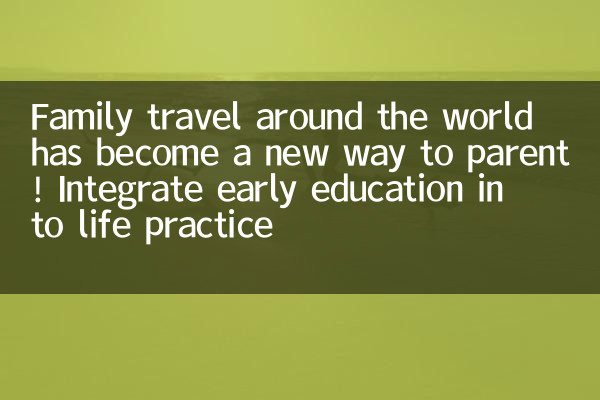Family travel around the world has become a new way to parent! Integrate early education into life practice
In recent years, a brand new way of parenting is quietly emerging around the world - family travel around the world. More and more parents choose to take their children out of the traditional classroom and complete early education through practical experiences during travel. This phenomenon has sparked widespread discussion and has become one of the hot topics in the past 10 days.
1. Overview of the phenomenon

According to the latest data, the number of families who choose to travel for a long time in 2023 increased by 35% compared with 2022, of which 42% of families of preschool children accounted for. This model of integrating education into travel life is called "borderless learning" by education experts.
| years | Number of travel families | The proportion of preschool children |
|---|---|---|
| 2021 | 12,500 | 28% |
| 2022 | 18,700 | 35% |
| 2023 | 25,300 | 42% |
2. Analysis of popular destinations
Judging from the popularity of social media discussions, the following destinations are the most popular among family travelers:
| Ranking | destination | Popular reasons | Educational Value Index |
|---|---|---|---|
| 1 | New Zealand | Natural Ecological Education | 9.2/10 |
| 2 | Japan | Cultural immersion experience | 8.7/10 |
| 3 | Italy | Art History Enlightenment | 8.5/10 |
| 4 | costa rica | Biodiversity Exploration | 8.3/10 |
| 5 | Denmark | Innovate educational concepts | 8.1/10 |
3. Comparison of educational effectiveness
According to data from the Child Development Research Institute, travel education and traditional education have significant differences in multiple dimensions:
| Evaluation dimension | Traditional education | Travel Education |
|---|---|---|
| Social skills | 76 points | 92 points |
| Problem-solving ability | 81 points | 95 points |
| Cultural inclusion | 68 points | 98 points |
| Environmental adaptability | 72 points | 96 points |
| Knowledge retention rate | 85 points | 93 points |
IV. Implementation Suggestions
For families considering this educational approach, experts make the following suggestions:
1.Age adaptation: The best period for the age of 3-6 is the best enlightenment period, but the intensity of the itinerary needs to be adjusted according to the individual differences of the child
2.Theme Planning: Set clear learning topics for each trip, such as nature, history, or language
3.Time Management: It is recommended to control the duration of a single trip to 2-4 weeks to avoid fatigue accumulation
4.Recording method: Encourage children to record their experiences through painting, photography or diary
5.Safety guarantee: Understand the medical resources of the destination in advance and purchase comprehensive travel insurance
5. Social response
This emerging education model has sparked heated discussions on social media. Supporters see this as an important addition to the rigid education system, while doubters are concerned about its sustainability and systemicity. A case sharing video of a well-known education blogger "Global Small Classroom" has received more than 1 million views, and the discussion in the comment area is lively.
6. Future prospects
With the popularization of remote work and the innovation of educational concepts, it is expected that the scale of the family travel education market will maintain an annual growth rate of more than 25% in the next five years. Educational institutions have also begun to launch supporting "travel course packages" to help families better plan their educational itineraries.
This practice of integrating education into life not only redefines the parent-child relationship, but also provides a new perspective for early childhood development. As a mother who practices this said, "The world is the best classroom, and experience is the most vivid teaching material."

check the details

check the details